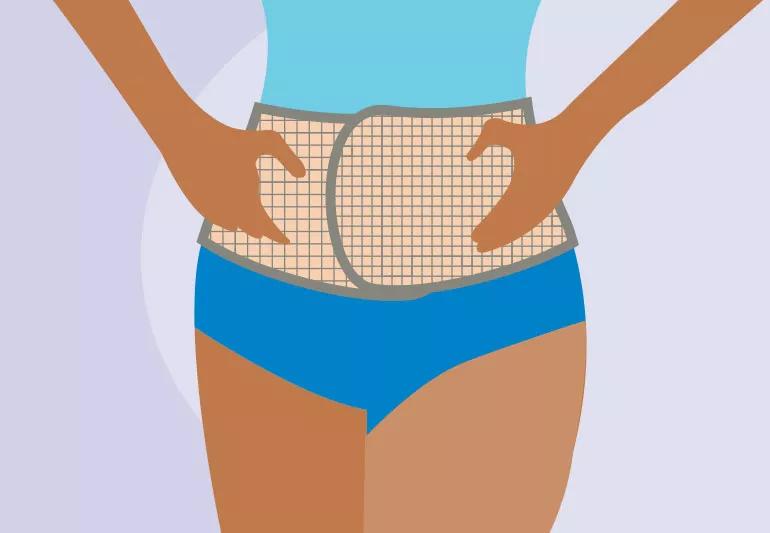Belly wraps provide physical support after you give birth

Image content: This image is available to view online.
View image online (https://assets.clevelandclinic.org/transform/78716028-075b-4740-9f4d-17b83f2b81ab/bellyBandPostPreg-1184711181-770x533-1_jpg)
Person wearing a post pregnancy belly band.
Navigating the postpartum time — or the time just after you’ve given birth — can be challenging. In the past nine months, your body has transformed significantly. Even after you give birth, you’ll still be dealing with physical changes, some of which might be unexpected or challenging.
Advertisement
Cleveland Clinic is a non-profit academic medical center. Advertising on our site helps support our mission. We do not endorse non-Cleveland Clinic products or services. Policy
This is all perfectly normal, says Ob/Gyn Erica Newlin, MD. “Your body has just gone through a major event, so you’ll feel sore and tired and need a little time to recover.”
One thing you might find helpful in the postpartum period is belly wrapping. “This refers to putting some sort of band around your abdomen after you deliver,” explains Dr. Newlin. “Some women even wear a band during pregnancy.”
Wearing a postpartum belly wrap (which is sometimes called a postpartum belly band) isn’t a new practice. In fact, people have been wrapping their bellies after giving birth for centuries. “Some cultures even have a tradition of wrapping the belly after giving birth,” notes Dr. Newlin.
Read on for insight on what a postpartum belly wrap can — and can’t — do, and tips on choosing one that’s right for you.
After you give birth, you experience multiple physical changes. Your breasts swell and become larger because you’re starting to produce milk. Your hormone levels fluctuate. And along with these changes, your uterus starts contracting.
“It’s basically just held a watermelon, so it has to go back down to the size that it was before,” says Dr. Newlin. “You can expect usually to lose around 20 pounds pretty quickly after delivery, just due to loss of the baby, placenta and fluid. But you may still look a little pregnant after delivery.”
Advertisement
People use belly bands for many reasons depending on how they feel physically. “You might feel out of sorts after giving birth because your ligaments are a little more stretched,” says Dr. Newlin. “A belly band can help provide some stability. Sometimes, they can help you feel more supported or help you with your posture.”
Don’t underestimate the importance of a little extra support during this time. “Other belly wraps can simply make you feel better as you’re healing,” Dr. Newlin adds. “As I mentioned, your uterus is still going back down a size so you may still look a little pregnant. So, the belly band may feel nice for you.”
For people who’ve had a C-section, belly bands can be especially useful to provide support as their incision heals. “They can also help with discomfort,” Dr. Newlin says.
There are many kinds of postpartum belly wraps available. “Some look more like girdles or are more structured,” Dr. Newlin explains. “Some almost look like a big headband that goes around your abdomen.”
Belly wraps or belly bands come in a variety of materials. Dr. Newlin suggests sticking to ones made from natural materials as much as you can. “Cotton can be less irritating to your skin,” she explains. “Also look at getting ones where you’re not having a lot of Velcro that’s irritating the skin.”
But if a belly band is causing you pain, that’s a sign that you should remove it. “If you feel like it’s cutting off any sort of circulation, that would be another reason to take it off,” cautions Dr. Newlin. “I also usually recommend that people don’t keep it on for prolonged periods at night while they’re sleeping.”
A belly band can offer both support and relief during the postpartum period. But there are limits to what a belly band can do. “In the long run, a belly band won’t make your waist smaller or help you lose weight,” says Dr. Newlin. Plus, “Don’t feel like you need to spend $100 on a belly band that promises that it will change your body forever. It won’t.”
Advertisement

Sign up for our Health Essentials emails for expert guidance on nutrition, fitness, sleep, skin care and more.
Learn more about our editorial process.
Advertisement
Having sex after giving birth isn’t only about being medically ready
It’s normal to experience some changes
Don't sweat it — it's fairly common
Bleeding is a risk and warrants taking care, but the reward of this lifesaving medication is great
Severe and debilitating headaches can affect the quality of your child’s life
Type 2 diabetes isn’t inevitable with these dietary changes
Applying a hot or cold compress can help with pain
Pump up your iron intake with foods like tuna, tofu and turkey